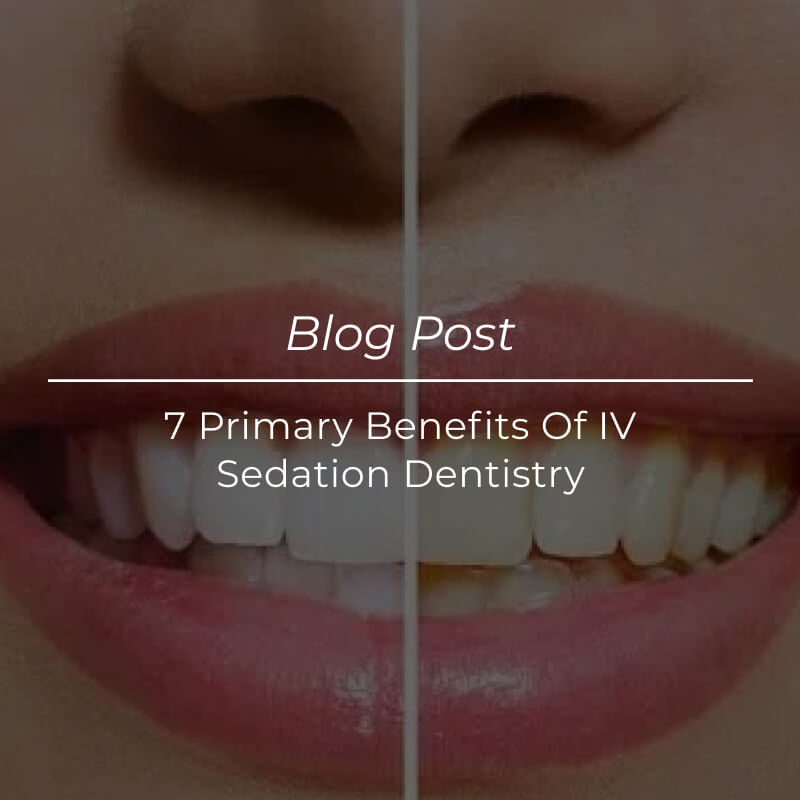-
Mon- Sat 08:00-18:00
-
Call Us Now 1300 99 1300

Do you fear going to the dentist or have anxiety before getting dental work done? You are not alone, so don’t worry if the answer is yes. Many people avoid getting any dental job done because they fear going to the dentist. That is why modern dentistry employs a method known as IV sedation dentistry to make your dental appointment relaxing and painless.
Experienced dentists typically use safe and efficient IV sedation techniques to keep you calm and comfortable during dental treatments. Nitrous oxide, intravenous (IV), and oral conscious sedation are a few sedation method choices. However, to administer some types of sedation, dentists must hold a certification or training.
Here, we will discover some fundamental information about IV sedation dentistry. So, go on to read this blog.
IV sedation dentistry helps you be peaceful, at ease, relaxed, and stress-free during dental processes. The method entails the intravenous infusion of drugs to maintain your state of relaxation while your dentist performs a dental operation. As a result, the patient is awake during treatment but unaware of smells, pains, or noises that might generally make him anxious. People who are scared and worried about seeing the dentist can consider IV sedation dentistry.
Utilising medication to induce relaxation and comfort during dental processes is what sedation dentistry does. Additionally, it enables your dentist to execute the dental procedure while you sleep efficiently.
However, one of the sedation methods that is typically utilised during dental, oral, plastic, and orthopaedic surgery is IV sedation, also known as intravenous sedation. In this method, the physician gives the patient sedatives intravenously to induce sleep. It serves as an excellent substitute for anaesthesia.
IV sedation is employed during quick yet uncomfortable surgical operations like cyst removal, teeth extraction, fracture reduction, etc. Additionally, it offers a safer alternative for those who suffer from circulation problems, diabetes, or a heart condition.
The following are some advantages of IV sedation methods:
1. Has quicker results
It provides instant results to reduce your anxiety and put you at ease in the dental chair. In contrast to oral sedation, IV sedative enters the bloodstream more quickly. As a result, its effects are more noticeable and immediate.
2. Enables Dentist To Immediately Notice Patient’s Abnormalities
While other body functions continue to run, IV sedation takes away your pain perception. Contrary to general anaesthesia, you can move and breathe while in IV sedative effect. Since your body moves when you’re in pain, it warns the dentist and other staff of any abnormalities perform during the surgical operations. It enables them to respond quickly.
3. Minimal Side Effects
Compared to general anaesthesia, IV sedation has fewer adverse effects. It enables medical personnel to precisely measure and administers the dosage. On the other hand, there is a possibility that general anaesthesia will be administered at excessive dosages, which could result in serious adverse effects. Additionally, it has the uncommon ability to halt cognitive processes temporarily.
4. Reduced Risk of Nausea and Blood Clots
An IV sedative reduces the risk of nausea and blood clots. However, some patients may develop side effects with other forms of anaesthesia, which could delay the surgical operation.
5. Encourages More Cooperation
Through IV sedation, you’ll feel at ease and relaxed. Additionally, it improves patient cooperation, which enables your dentist to complete more work in less time.
6. Speedy Recovery
General anaesthesia takes longer to recover than IV sedatives. As a result, once the sedative’s effects have worn off, you can feel very little unease. In contrast, a patient under anaesthesia typically needs a few hours to recover from grogginess and regain their senses.
7. No Memory
Little or no memory is common in IV sedation dentistry. It gives a pain-free experience to patients – patients can’t recollect what happened to them during the entire treatment procedure. As a result, it encourages maximum patients to continue visiting their dentist with a positive experience.
Since patients are more comfortable and respond better under IV sedation, the risks associated with surgery are reduced. The technique is incredibly effective in challenging dental treatments, including root canal therapy, implant surgery, wisdom tooth extraction, and gum surgery.
Care Family Dental Toorak is committed to offering the highest quality dental care in a welcoming, warm, and compassionate setting. With our certification in IV sedation dentistry, we ensure safe sedation dentistry for all our patients.
Call us on (03) 9999 3324 or drop an email at to discuss and book a sedation dentistry consultation.
Yes, any dental operation can be carried out safely and effectively using IV sedation. Care Family Dental, we can assure you that our IV sedation method is highly secure and efficient. To use it, our professionals have a unique certification. This method has a rich success history, a low failure rate, and rare challenges.
We care for and observe our patients throughout dental procedures. However, IV sedation is the most reliable among all available sedation methods. Following IV sedation, you could feel a little sleepy. Nevertheless, the discomfort will go away a few hours after the dental surgery.
Compared to other forms of sedation, IV sedation acts more quickly. After taking it, the patient usually takes 15 to 30 minutes to fall asleep. You will take 20 minutes to regain your senses once the IV sedative is removed. The total recovery from sedative effects often takes six hours. However, you might not be a suitable candidate for the IV sedation procedure if you have high blood pressure, have signs of glaucoma, are overweight, are pregnant or are a nursing mother.
You will need to prepare before receiving the IV dose of sedative.
To learn more, get in touch with us.








